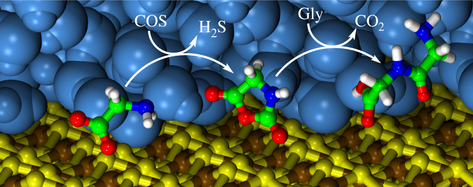RUB-chemists research peptide bonds in the virtual laboratory
The emergence of the “primordial protein” from a purely chemical point of view still gives rise to many speculations: is it possible that, long before the appearance of life on earth, proteins could have been formed efficiently from their amino acid building blocks? Theoretical chemists under the guidance of Professor Marx have managed to simulate a complete peptide synthesis on the computer under prebiotic conditions in compliance with the so-called “iron-sulfur world” hypothesis. According to this hypothesis, these prebiotic proteins could constitute the first building blocks of life itself. This study has now been published as one of the rare "Three-Page Communications to the Editor” in the renowned periodical “Journal of the American Chemical Society" (JACS).

Figure: Glycine (left), activated glycine (middle) and the GG
dipeptide (left) on the interface between pyrite and water under
extreme conditions. You can download a bigger version of this image here.
Prebiotic Chemistry
One of the many possibilities how life on earth could have evolved is the formation of complex biomolecules on a purely chemical basis, i.e. without falling back on perfected biological synthesis machines like the ribosome, for example. Such speculations have, indeed, been brought into conjunction with Darwin himself, who apparently expressed such postulations in a letter to a botanist in the year 1871. (“But if (and Oh! what a big if!) we could conceive in some warm little pond, with all sorts of ammonia and phosphoric salts, light, heat, electricity, etc., present, that a protein compound was chemically formed ready to undergo still more complex changes, at the present day such matter would be instantly devoured or absorbed, which would not have been the case before living creatures were formed.”) “We therefore asked ourselves: Is it really a legitimate possibility that proteins simply formed spontaneously in this prebiotic time era?”, Professor Dominik Marx explains the starting point of this investigation,“... and if so, how exactly did they achieve this?”
Iron-Sulfur World Scenario
The current study is founded on one of the most controversially discussed proposals, viz the so-called “Iron-Sulfur World” scenario, which the chemist Waechterhaeuser has been drawing up in detail since the middle of the 1980s and has since been open to scientific scrutiny. Essential components of this hypothesis are, on the one hand, the surfaces of iron-sulfur minerals and, on the other, the high temperatures and pressures of the water medium, in which the peptide synthesis is thought to occur via a “peptide cycle”. "It is, of course, immensely difficult to carry out such reactions at hundreds of degrees centigrade and bar pressure in a controlled way, thus enabling us to explore the consequences of such exotic reaction conditions”, admits Dr. Nisanth Nair, a member of the Marx research group thoughtfully. As a consequence, the chemists simply relocated the experiment to the virtual laboratory. Making use of state-of-the-art simulation methods, it becomes possible not only to reproduce these extreme conditions, but also to compare them one on one to standard experimental conditions. “We actually heated up and compressed our small peptide in the computer and observed what happened!”, clarifies principal author Dr. Eduard Schreiner.
The Key: Water at Extreme Conditions
“With surprise, we realised that Waechterhaeusers', for biochemical processes at any rate, rather unusual reaction conditions actually accelerated the formation of the peptide bond”, Professor Marx elucidates the results. Especially meaningful has been the fact that water under these exotic conditions exhibits completely different properties to those seen in liquid water out of the tap for example, and exactly this observation has been reproduced excellently on the computer. “The computational cost of this study was, however, exorbitant, as we had to simulate nearly ten individual reaction steps as well as their reverse reactions at three different sets of conditions, to crack the peptide cycle after a series of failures”, recounts Eduard Schreiner, who earned his doctoral cap with this study.
Success depends on gigantic Supercomputers
“With this huge computational expenditure the published work arguably sets a new world record in the field of ab initio molecular dynamics”, reports Professor Marx, not without pride. It was made possible in the first place by extensive use of an IBM Blue Gene parallel computer at the John von Neumann Institute for Computing located in Juelich. “Of interest in this context is Darwin's remark 'It is mere rubbish thinking at present of the origin of life; one might as well think of the origin of matter”, added Marx, “for exact such investigations are being carried out on the same supercomputer by colleagues in the department of physics!”
Direct link to this page: www.theochem.ruhr-uni-bochum.de/go/prebiotic.html



